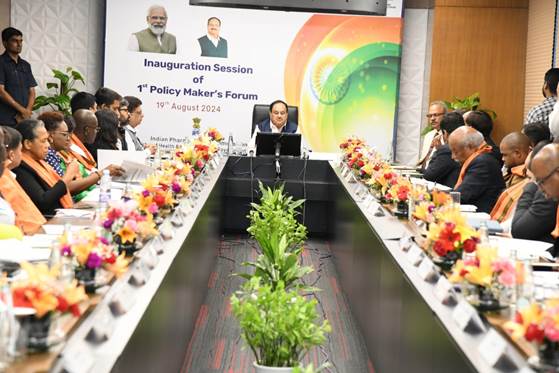New Delhi: J.P. Nadda, Union Minister of Health and Family Welfare & Chemicals and Fertilizers, inaugurated the ‘First Policy Makers’ Forum’ today, a significant event aimed at elevating India’s standing in the global pharmaceutical sector. The forum, running until August 22, 2024, is organized by the Indian Pharmacopoeia Commission (IPC) in collaboration with the Ministry of Health & Family Welfare and the Ministry of External Affairs. It brings together an international delegation of policymakers and drug regulators from 15 countries, focusing on fostering global recognition of the Indian Pharmacopoeia (IP) and the expansion of India’s pharmaceutical footprint.
In his opening remarks, Nadda emphasized India’s crucial role in global health, noting that the forum provides an excellent platform to exchange views on the safety, efficacy, and quality of pharmaceutical products. “India has long been identified as the ‘pharmacy of the world,’ and our generic drugs play a vital role in treating diseases like malaria, HIV-AIDS, and tuberculosis in developing nations,” he stated.
A key highlight of the event was the launch of two innovative digital platforms: the IP Online Portal and the Adverse Drug Reaction Monitoring System (ADRMS) software. The IP Online Portal represents a major step towards digitalizing the Indian Pharmacopoeia, making drug standards more accessible to stakeholders worldwide. The ADRMS software, developed as part of India’s Pharmacovigilance Programme, is the country’s first indigenous medical product safety database. It streamlines the reporting of adverse drug events, enhancing the nation’s pharmacovigilance infrastructure.
Nadda underscored India’s commitment to global health through various initiatives, including the Pradhan Mantri Bhartiya Janaushadhi Pariyojana (PMBJP), commonly known as the Janaushadhi Scheme. This program aims to provide high-quality, affordable medicines, particularly to the underprivileged, by establishing Jan Aushadhi centers across the country. “The success of this initiative stands as a model that could be adapted by other countries to improve global access to affordable healthcare,” he added.
The forum also highlighted India’s leadership in vaccine production, with Nadda noting that India supplies 70 percent of the World Health Organization’s vaccine demand. He praised India’s role in the global fight against COVID-19 through the Vaccine Maitri Programme, which supplied vaccines to several countries worldwide.
Dr. Arunish Chawla, Secretary of the Department of Pharmaceuticals, pointed out the growing global trend towards generic medicines, which adhere to WHO standards and are significantly cheaper than branded alternatives. He highlighted the success of the Janaushadhi Programme in reducing out-of-pocket healthcare expenses for Indians, a model that could benefit other nations.
The forum’s international delegates are scheduled to visit a Jan Aushadhi Kendra in Agra and state-of-the-art vaccine and drug manufacturing facilities in Hyderabad, offering them a comprehensive understanding of India’s pharmaceutical capabilities.
The Policy Makers’ Forum and the launch of these digital platforms mark significant strides in India’s efforts to ensure that its pharmacopoeia and healthcare standards are recognized globally, further solidifying the nation’s position as a leader in the pharmaceutical sector.





